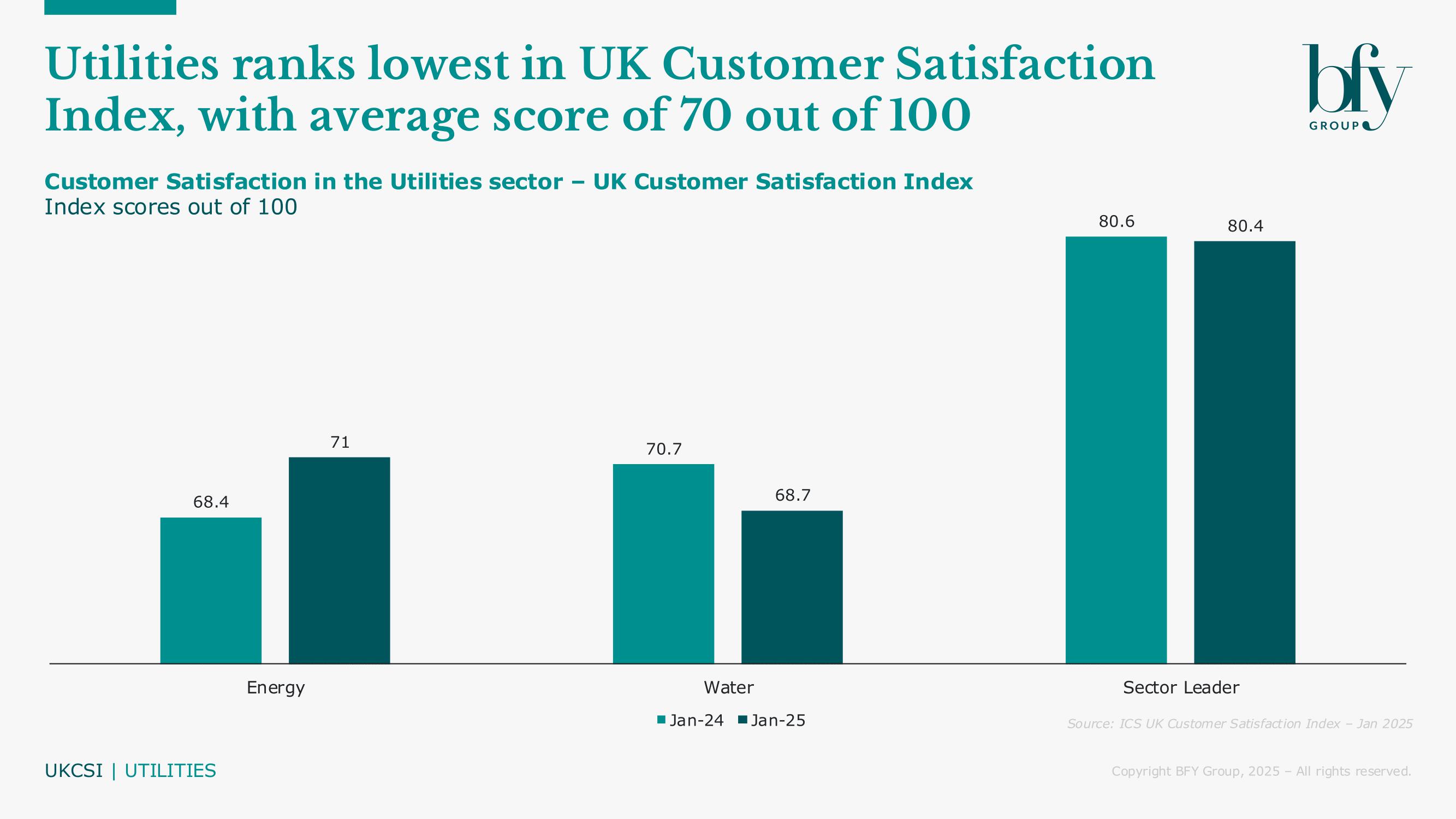The latest UK Customer Satisfaction Index (UKCSI) reveals a stark picture for Utilities, against a backdrop of political and regulatory pressure.
While 31% of customers across all sectors are willing to pay more to receive excellent service, Utilities continues to rank lowest in customer satisfaction. With service failures now costing UK businesses £7.3bn monthly, and Utilities lagging behind in how its customers perceive it, the need for change remains difficult to ignore.
Insights from the UKCSI show that customer satisfaction has a direct impact on financial performance, market share, and long-term business sustainability. Utilities scored an average of 70 out of 100 (across 5 dimensions of Experience, Complaint Handling, Customer Ethos, Emotional Connection and Ethics), making it the lowest-rated industry in the index. While energy providers have showed a continued improvement since a low of 67.9 in July 23, the water sector saw a decline in customer satisfaction and is now lagging energy, indicating significant room for improvement.

What does the latest UKCSI show for Customer Experience leaders?
Customer Experience is a differentiator
Key points:
- The utilities industry remains highly transactional, yet customer expectations are shifting toward a more service-oriented model.
- 31% of customers are willing to pay more for excellent service, indicating that price is not the only deciding factor for customers.
Organisations that excel in customer service are more likely to retain and grow their customer base, increasing revenue and brand loyalty. This aligns to our recent article on adopting the Universal Agent model to drive a more customer-centric approach.
Service failures are a persistent drain on cost and time
Key points:
- Service failures cost UK businesses an estimated £7.3bn per month in lost productivity and employee time.
- 64% of employees spend an average of four days per month dealing with customer complaints and service failures.
Investing in root cause analysis, proactive service delivery, and robust customer support can drastically reduce these costs and improve efficiency. We explored these topics in an article late last year, discussing how energy suppliers can take proactive steps to align with Ofgem’s vision for a sector-leading, customer-centric culture.
Technology should enhance, not replace, customer service
Key points:
- Emerging technologies like AI and automation can improve efficiency but risk "dehumanising" customer interactions, which could negatively affect satisfaction.
- Emotional connection and perceptions of care are key factors in high customer satisfaction, according to UKCSI measures.
- A balanced approach is required, with technology supporting but not replacing human empathy and expertise.
- 38% of customers feel that the best way an organisation demonstrates care is by acting in their best interests, which often requires a human touch.
Whilst AI can be a great asset, the balance in using it correctly is paramount to driving customer-centricity. We’ve previously discussed how we’re helping to enable this balance for our clients here.
Complaint handling is a pain point, but also a huge opportunity
Key points:
- The biggest gap between satisfied and dissatisfied customers stems from complaint resolution, feeling of reassurance, keeping promises and designing experience around customer needs.
- Over 20% of customers believe that an organisation’s care is shown in their ability to respond in a crisis, showing that complaints handling can be a route to customer advocacy.
- Speed of resolution, transparency, trust and ease of contacting the right person to help are key drivers in improving customer sentiment.
- Complaints processes have to be streamlined, simple, with empowered staff able to resolve issues effectively.
In our most recent complaints article, we shared five actions to help suppliers close the gap between customer service ratings and complaints volumes, presenting a multi-£m opportunity.
Trust can be built through ethics and transparency
Key points:
- Only 51% of customers believe that their utilities provider genuinely cares about them -the lowest percentage among all sectors surveyed.
- Customers increasingly expect businesses to demonstrate ethical leadership, transparency, and a commitment to "doing the right thing."
Utilities need to go beyond compliance and actively showcase their commitment to sustainability, fairness, and responsible business practices.
Opportunities to bridge the customer satisfaction gap
To bridge the customer satisfaction gap and position their businesses for long-term success, Utilities leaders have opportunities to:
- Invest in omnichannel customer experience design or review to ensure seamless and consistent interactions, across all digital and human touchpoints.
- Leverage AI and data analytics with focus on all exception cases factored into designs, to personalise service delivery while maintaining a human-centric approach.
- Enhance complaint resolution processes by empowering staff, improving communication, and adopting a proactive problem-solving culture.
- Commit to transparency and visible ethical practices to build customer trust and differentiate from competitors.
- Take the time to measure the return on investment in customer service to ensure continued investment in customer satisfaction as part of driving business performance goals.
Sustained, superior customer experience is the result of combining operational excellence, responsiveness to problems, care, emotional connection and ethics.
The latest UKCSI makes it clear that customer satisfaction is no longer a "nice-to-have" but a core business driver. In a sector where trust is paramount and switching providers is increasingly easy, a customer-first mindset can be as much of a differentiator as product range.
By focusing on service quality through consistent and fully integrated processes, customer-centric leaders empowering teams, and strategic technology adoption, Utilities can enhance customer relationships, drive financial performance, and lead the way in an evolving marketplace.
How can we help?
At BFY we’re well-positioned to support Utilities across all areas aspects of customer experience transformation. Whether it’s assisting with the business case for CX change, conducting process reviews and design to ensure omni-channel consistency, or leading full-scale transformation activities, we guide you every step of the way. This includes empowering your people to create a truly leadership-driven, customer-centric culture.
We also assist in developing and implementing ESG strategies, helping you design meaningful measures and reporting to showcase your broader environmental and social impact. The ICS report highlighted this as a key factor, showing a strong correlation between high customer service levels and customers feeling an emotional connection and trust in a company’s ethics and transparency. This underscores that operational efficiency alone is not enough - businesses must demonstrate that their practices and services are rooted in ethical standards and genuine care for their customers.
If you’d like to explore the opportunities to improve customer experience in your organisation, contact Jonathan Paton.
Jonathan Paton
Senior Manager
Jon specialises in Customer Operations leadership, customer contact, and operational service delivery transformation/improvement.
View Profile

